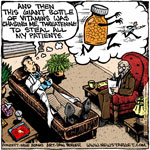Three Things Parents Need to Know
| Share on Facebook | Share on Twitter | Share on Google+ |
The combination of vitamin B6 and magnesium for children diagnosed with one of the diseases on the autistic spectrum has been described as a "breakthrough autism intervention." Like most treatments for childhood autism, it does not help every child, but it is inexpensive, safe, and produces visible results about 50 per cent of the time.
Many children who have autism don't have the enzymes the body needs to use certain B vitamins. A rather large number of children who have autism don't have the enzyme that converts the pyridoxine and pyridoxal forms of vitamin B6 found in plant and animals foods, respectively, into the active form of the vitamin, pyridoxal 5-phosphate.
It's now possible simply to take a supplement that contains the already-activated pyridoxal 5-phosphate. This is probably the best way to go for most children who have autism. But if you can't find this form of B6, or you can't afford products that contain it, then you may be able to get the same effect by giving your child the more readily available pyridoxine form of B6 along with a magnesium supplement.
Vitamin B6 and magnesium supplements for children work together to improve sleep, speech, and interactions with playmates far more effectively than either supplement given alone. Various studies have given children from 100 to 700 milligrams of magnesium plus 75 to 800 milligrams of pyridoxine every day.
The higher dosages used in these study can cause problems. Anything over about 200 milligrams of magnesium a day, in a child under 10, can cause diarrhea. And 800 milligrams of B6 a day is almost enough to cause side effects even in an adult.
The best results of the combination of B6 and magnesium was found in a French study that dosed the two supplements according to the child's weight.
- For every kilogram the child weighed, the dosage of magnesium was 6 mg.
- For every kilogram the child weighed, the dosage of pyridoxine (vitamin B6) was 0.6 mg.
Converting for American measurements, this is approximately 3 mg of magnesium and 0.3 mg of vitamin B6 for every pound the child weighed. But using this dosing regimen, the French doctors saw:
- Improvements in developmental delays (slower development of talking, walking, and other skills) in 15 out of 33 children.
- Reductions in repetitive behaviors in 18 out of 33 children.
- Improvements in social interactions in 23 out of 33 children, and
- Improvements in language in 24 out of 33 children.
The lower-dose B6 plus magnesium caused no side effects, and the cost of the supplements was less than $0.50 per day. However, within a few days after the supplementation was stopped, the improvements in behavior ceased.
Both vitamin B6 and magnesium play important roles in many enzymes in the brain and the rest of the body. Using doses of vitamin B6 and magnesium low enough to avoid side effects often helps autistic children and their parents better cope with the disease.
Selected Reference:
Mousain-Bosc M, Roche M, Polge A, Pradal-Prat D, Rapin J, Bali JP. Improvement of neurobehavioral disorders in children supplemented with magnesium-vitamin B6. II. Pervasive developmental disorder-autism. Magnes Res. 2006 Mar;19(1):53-62.
-
Skin CareMen Skin Care
-
Free ResourcesFree eBooks
-
A good laugh and a long sleep are the best cures in the doctor's book.Irish Proverb
-
Featured Health Supplement
 The restoration and maintenance of normal organ and brain function and a strong immune system is the key to vibrant health and in
avoiding premature-aging!
The restoration and maintenance of normal organ and brain function and a strong immune system is the key to vibrant health and in
avoiding premature-aging!
-



















